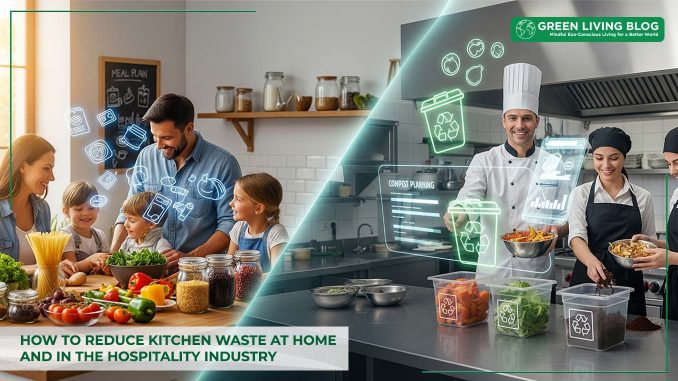
From home kitchens to professional ones, waste reduction starts with awareness.
Whether you’re cooking dinner for your family or preparing hundreds of meals a day in a restaurant, kitchens can generate a significant amount of waste.
Uneaten food, spoiled produce, single-use packaging and cooking by-products often end up in the bin.
But much of this waste is preventable, and reducing it benefits both the environment and your bottom line.
At home: small changes with a big impact

Reducing kitchen or food waste at home doesn’t require radical lifestyle changes. Often, it’s about making more intentional choices:
- Plan meals based on what you already have in the fridge or pantry.
- Store food correctly to extend freshness and prevent spoilage.
- Use leftovers creatively, turning extra rice into stir-fry or roasting vegetables into soup.
- Compost organic scraps like vegetable peels and coffee grounds instead of sending them to the landfill.
- Avoid over-packaged goods and consider shopping at refill or bulk stores.
These everyday actions can dramatically reduce the volume of waste a household produces, while saving money and supporting more sustainable food habits.
In hospitality: building systems that support sustainability
Restaurants, cafés and catering businesses face different challenges. The scale is bigger, regulations are stricter, and the margin for error is smaller. But this also means the potential for impact is greater.
Commercial kitchens benefit from structured systems rather than one-off actions. Regular staff training, efficient stock management and clear waste separation processes are all key. Many businesses now work with local farms to redirect food scraps into animal feed or compost, creating closed-loop systems that benefit the wider community.
Another essential practice is cooking oil collection. Improper disposal of used oil can clog pipes, cause hygiene issues and contribute to environmental pollution. When collected professionally, however, that oil can be recycled into biodiesel or used in industrial processes, turning a waste product into a renewable resource.
Choosing service providers that make a difference

Sustainability also depends on the partners a business chooses. Working with waste collection companies that prioritise environmental recovery ensures that kitchen waste is managed responsibly.
For instance, uk.quatra.com offers nationwide solutions specifically designed for the catering industry, making it easier for food businesses to stay compliant with waste regulations while contributing to the circular economy. Their approach goes beyond collection by ensuring full traceability, operational transparency, and measurable CO₂ reduction through the smart reuse of waste streams.
Waste reduction is a shared responsibility
Whether in a household or a commercial kitchen, reducing waste starts with mindset and is sustained through good habits and the right partnerships. By acting intentionally and choosing solutions that close the loop, both individuals and businesses can significantly lower their environmental impact — one plate at a time.
Technology as an ally in waste reduction

Digital tools are increasingly helping both households and the hospitality sector to cut down on waste. Apps that track expiry dates, provide recipe suggestions based on leftover ingredients, or allow restaurants to monitor portion sizes can make waste reduction more practical and data-driven. In professional kitchens, smart inventory systems help chefs order only what is needed, while AI-powered platforms can predict demand more accurately, reducing overproduction. By combining traditional practices with modern technology, kitchens of every scale can take waste reduction to the next level and make sustainability more accessible.
Engaging consumers and staff in the journey
Sustainable practices are most effective when everyone involved feels responsible and motivated. At home, this means involving family members in meal planning, shopping more consciously, and teaching children about the value of food. In the hospitality sector, staff engagement is equally crucial: chefs, servers, and cleaning crews all play a role in preventing unnecessary waste. Some restaurants even share data with their teams about how much food has been saved through better practices, turning waste reduction into a collective achievement. On the customer side, offering flexible portion sizes, promoting “take-home” options for leftovers, and communicating openly about sustainability goals can build stronger loyalty while reducing waste. By creating a culture of awareness and pride around these initiatives, both households and businesses can transform small actions into long-term impact.
![]()
Author Profile

- Eco Warrior by day, Eco Blogger by night trying to get the eco balance right.
Latest entries
 Best practicesFebruary 20, 2026How To Reduce Waste Through Smarter Office Supply Choices
Best practicesFebruary 20, 2026How To Reduce Waste Through Smarter Office Supply Choices Green GuidesNovember 3, 2025The Beginner’s Guide to Making Your Own Nontoxic Candles at Home
Green GuidesNovember 3, 2025The Beginner’s Guide to Making Your Own Nontoxic Candles at Home Green Home GuidesOctober 14, 2025What are Eco-Friendly Tissue Options for Modern UK Homes?
Green Home GuidesOctober 14, 2025What are Eco-Friendly Tissue Options for Modern UK Homes? Best practicesSeptember 17, 20253 Ways Young Families Can Commit to Sustainable Living
Best practicesSeptember 17, 20253 Ways Young Families Can Commit to Sustainable Living





Leave a Reply
You must be logged in to post a comment.